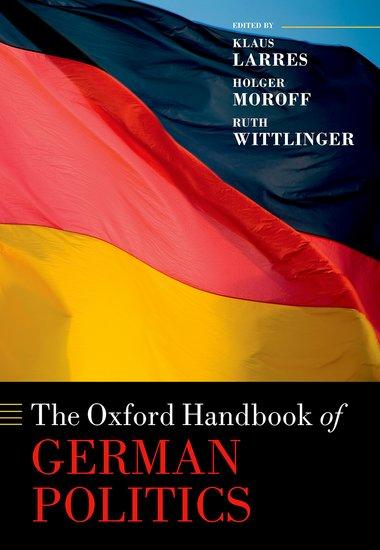
Zustellung: Di, 24.06. - Sa, 28.06.
Versand in 2 Wochen
VersandkostenfreiFew countries have caused or experienced more calamities in the 20th century than Germany. This handbook provides a comprehensive overview of some of the major issues of German domestic politics, economics, foreign policy, and culture by leading experts in their respective fields.
Inhaltsverzeichnis
- Introduction
- PART I: LEADING SCHOLARS AND THEIR INTERPRETATIONS OF GERMAN HISTORY FROM WORLD WAR II TO THE PRESENT
- 1: Konrad H. Jarausch: Encounters with Modernity: The German Search for Alternatives in the Twentieth Century
- 2: Heinrich August Winkler: From Post-National Democracy to Post-Classical Nation-State
- 3: Ute Frevert: Emotional Styles in Postwar German Politics
- 4: Klaus von Beyme: The Development of Germany after 1945
- PART II: GERMANY DURING THE COLD WAR ERA
- 5: Klaus Larres: Atlantic Integration and "Ever Closer Union": West Germany, the U.S., and European Unity during the Cold War
- 6: Peter Ruggenthaler: Germany and the Soviet Union during the Cold War Era
- 7: Gert-Joachim Glaeßner: The Governmental System and Political History of the GDR
- 8: Larissa R. Stiglich: The End of the Cold War and the Process of German Unification
- PART III: GERMANY SINCE 1990
- Political Institutions and Constitutional Design
- 9: Ray Hebestreit and Karl-Rudolf Korte: The Executive: The German Government and Civil Service
- 10: Suzanne S. Schüttemeyer and Sven T. Siefken: The German Bundestag: The Core Institution in a Parliamentary Democracy
- 11: Arthur Benz: The Federal System and the Länder
- 12: Russell A. Miller: The German Legal System and Courts
- 13: David F. Patton: The 'Old Five': The Bonn Parties in the Berlin Republic
- 14: Hartwig Pautz: Germany's Political Parties: The Newcomers
- Political Economy and Policy Making
- 15: Christian Schweiger: The German Economic Model: from Germany's Social Market Economy to Neoliberalism?
- 16: Andreas Busch: Germany's Trading System and Export Driven Economy
- 17: Janine Jacob: Germany's Banking and Financial System
- 18: Peter Starke: The German Welfare State
- 19: Dietrich Thränhardt: The Immigration System and the Rule of Law
- 20: Carl Lankowski: The Merkel Era: Environmental Politics and the 'Energiewende' (energy transition)
- Culture and Society
- 21: Reinhold Sackmann: Demographics and Generational Transition and Politics
- 22: Detlef Pollack and Olaf Müller: Religion and the Churches
- 23: Joseph Cronin: Jewish Life and Politics in Postwar Germany
- 24: Priscilla Layne: Identity and Diversity in Post-Unification Germany
- 25: Michael Braun: German Literature, Theatre and Film since 1990
- 26: Marion Deshmukh: German Art After 1990
- PART IV: GERMANY IN GLOBAL AFFAIRS
- 27: Holger Moroff: German Foreign Policy: Roots, Reasonings, and Repercussions
- 28: Carine Germond: Franco-German Relations and the European Integration Process since 1990
- 29: Sebastian Harnisch: Germany and EU Foreign Policy
- 30: Patricia Daehnhardt: Germany in the EU: An Assertive Status Quo Power?
- Germany and the World Beyond Europe
- 31: James Sperling: German Multilateralism after the Cold War
- 32: Markus Kaim: Germany and NATO
- 33: Klaus Schwabe: German-American Relations from 1945 to the Present
- 34: Stephen F. Szabo: Three Chancellors and Russia: German-Russian Relations since 1990
- 35: Volker Stanzel: A Quarter Century of German Relations with the Indo-Pacific
- PART V: LOOKING BACKWARD AND FORWARD
- 36: Stefan Kornelius: Angela Merkel in Power: How Influential was the Merkel Era?
- 37: Jackson Janes: Leaders in Partnership: Germany in the Biden Era
Mehr aus dieser Reihe
Produktdetails
Erscheinungsdatum
19. Oktober 2022
Sprache
englisch
Seitenanzahl
720
Reihe
Oxford Handbooks
Herausgegeben von
Klaus Larres, Holger Moroff, Ruth Wittlinger
Verlag/Hersteller
Produktart
gebunden
Gewicht
1401 g
Größe (L/B/H)
254/180/48 mm
ISBN
9780198817307
Entdecken Sie mehr
Bewertungen
0 Bewertungen
Es wurden noch keine Bewertungen abgegeben. Schreiben Sie die erste Bewertung zu "The Oxford Handbook of German Politics" und helfen Sie damit anderen bei der Kaufentscheidung.































